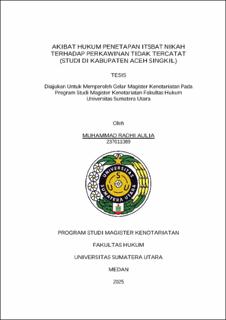| dc.description.abstract | Marriage is a physical and spiritual bond between a man and a woman as husband and wife, intended to build a harmonious and everlasting family based on the values of the Almighty God. In Indonesia, marriage is regulated under Law Number 1 of 1974 on Marriage, which requires that every marriage be registered by the competent authority-in this case, by a Marriage Registrar Officer as stipulated in Article 2 paragraph (2) of the Marriage Law. A recurring issue is the high number of unregistered marriages, particularly in Aceh Singkil Regency. Data from the Civil Registry Office (DISDUKCAPIL) of Aceh Singkil indicates that over 50 percent of total marriages are unregistered. This phenomenon raises significant legal and social concerns. This study aims to examine the extent to which itsbat nikah (marriage validation) decisions can resolve legal problems arising from unregistered marriages, as well as their legal implications in terms of civil law and population administration. This research adopts an empirical juridical method with a descriptive-analytical approach. Primary data were obtained through interviews, while secondary data were collected from legal materials, using both field research and library research techniques. The findings reveal several contributing factors to the prevalence of unregistered marriages in Aceh Singkil, including cultural influences, economic limitations, complicated administrative procedures, juvenile delinquencу, geographical barriers, weak involvement of village religious leaders, and reactive behavior of the community. The itsbat nikah process at the Aceh Singkil Sharia Court includes application registration, document verification, judge panel assignment, court hearings, and issuance of the itsbat nikah decision. Applicants must fulfill various administrative requirements, such as a petition letter, personal identification, evidence of marriage, a statement from the Office of Religious Affairs (KUA), and witness testimony. The itsbat nikah decision carries legal force as a declaratory ruling that affirms the validity of previously unregistered marriages, serving as a legal basis for marriage registration at the KUA and state administrative recognition. The legal consequences include formal recognition of the marital status of the couple, assurance of civil rights such as inheritance and joint property claims, and administrative legitimacy, including updates to Family Cards (KK), Identity Cards (KTP), and the issuance of children's birth certificates. | en_US |


